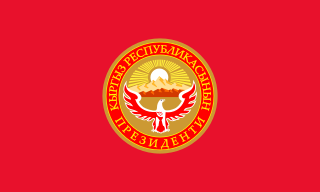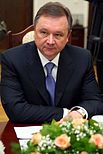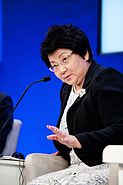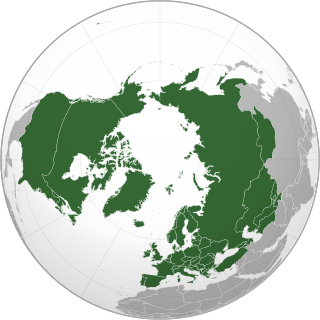
The history of the Kyrgyz people and the land now called Kyrgyzstan goes back more than 2,000 years. Although geographically isolated by its mountainous location, it had an important role as part of the historical Silk Road trade route. In between periods of self-government it was ruled by Göktürks, the Uyghur Empire, and the Khitan people, before being conquered by the Mongols in the 13th century; subsequently it regained independence but was invaded by Kalmyks, Manchus and Uzbeks. In 1876 it became part of the Russian Empire, remaining in the USSR as the Kirghiz Soviet Socialist Republic after the Russian Revolution. Following Mikhael Gorbachev's democratic reforms in the USSR, in 1990 pro-independence candidate Askar Akayev was elected president of the SSR. On 31 August 1991, Kyrgyzstan declared independence from Moscow, and a democratic government was subsequently established.

The Politics of Kyrgyzstan, officially known as the Kyrgyz Republic takes place in the framework of a parliamentary representative democratic republic, whereby the President is head of state and the Prime Minister of Kyrgyzstan is head of government. Executive power is exercised by the government. Legislative power is vested in both the government and parliament. The Economist Intelligence Unit has rated Kyrgyzstan as "hybrid regime" in 2016.

The Tulip Revolution or First Kyrgyz Revolution led to President of Kyrgyzstan, Askar Akayev's fall from power. The revolution began after parliamentary elections on February 27 and March 13, 2005. The revolutionaries alleged corruption and authoritarianism by Akayev, his family and supporters. Akayev fled to Kazakhstan and then to Russia. On April 4, 2005, at the Kyrgyz embassy in Moscow, Akayev signed his resignation statement in the presence of a Kyrgyz parliamentary delegation. The resignation was ratified by the Kyrgyz interim parliament on April 11, 2005.

Felix Sharshenbayevich Kulov is a Kyrgyz politician who was Prime Minister of Kyrgyzstan from 2005 to 2007, following the Tulip Revolution. He first served from 1 September 2005 until he resigned on 19 December 2006. President Kurmanbek Bakiyev reappointed him acting Prime Minister the same day, but parliamentary opposition meant Bakiyev's attempts to renominate Kulov in January 2007 were unsuccessful and on 29 January the assembly's members approved a replacement. Kulov cofounded and leads Ar-Namys, a political party, and chairs the People's Congress, an electoral alliance to which Ar-Namys belongs.

The Supreme Council is the unicameral Parliament of the Kyrgyz Republic. It has 120 seats with members elected for a five-year term by party-list proportional voting.

The Constitution of Kyrgyzstan is the supreme law of the Kyrgyz Republic. The constitution in force until 2010 was passed by referendum on 21 October 2007 and it is based on the first post-Soviet constitution originally adopted on 5 May 1993, a year and a half after the country had gained independence from the former Soviet Union. The 1993 constitution had been amended several times: first on 10 February 1996, then on 2 February 2003, and finally twice in quick succession on 9 November 2006 and 15 January 2007 after the Tulip Revolution of March 2005. The last two amendments were adopted under pressure from protracted public protests in the capital Bishkek, but they were annulled in September 2007 by the Constitutional Court, which restored the 2003 constitution and paved the way for another constitutional referendum in October 2007. The description that follows is based on the text of the October 2007 constitution.
Nationwide Social Democratic Party is a political party in Kazakhstan led by former Presidential election candidate Zharmakhan Tuyakbay. The party was registered by the authorities in January 2007, aiming to become a member of the Socialist International (SI). The party was admitted into the SI as a consultative member in 2012.

A constitutional referendum was held in Kyrgyzstan on 21 October 2007, following the constitutional crisis caused by amendments passed since the Tulip Revolution in 2005 being invalidated by the Constitutional Court of Kyrgyzstan on 14 September 2007. Voters were asked whether questions on a new constitution and electoral law. Both were approved by over 95% of voters.

Igor Vitalyevich Chudinov is a former Prime Minister of Kyrgyzstan. He was appointed to that position on December 24, 2007, following the resignation of Iskenderbek Aidaraliyev. Prior to his appointment, he was an energy and industry minister in the Kyrgyz government.
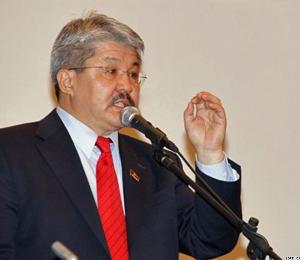
Bakyt Beshimov is a leader of parliamentary fraction and deputy chairman of Social Democratic Party of Kyrgyzstan. Bakyt Beshimov is a prominent opposition leader, famous for his liberal views, and speaking out against Kurmanbek Bakiyev's and Askar Akayev's regimes.

A presidential election was held in Kyrgyzstan on 23 July 2009. The date was set after the constitutional court ruled that the extension of the presidential term from four to five years did not apply until the next presidential election, calling for elections by 25 October 2009; in response, a parliament committee proposed the July election date, which was then passed by the incumbent president Kurmanbek Bakiyev's Ak Jol-dominated parliament. Bakiyev had previously announced his intention to run for reelection. Bakiyev was re-nominated on 1 May 2009.
United People's Movement is a coalition currently active in Kyrgyzstan. The coalition was formed in December, 2008 as an umbrella group representing various factions in opposition to Kyrgyz President Kurmanbek Bakiyev, and includes parties such as Ata Meken, Ak Shumkar, Asaba and Jany Kyrgyzstan, as well as the Social Democrats – which is the only party represented in parliament besides the ruling, and pro-Bakiyev, Ak Zhol.

Early parliamentary elections were held in Kyrgyzstan on 10 October 2010. All 120 seats of the Supreme Council were elected by the party list system. Seats were allocated to all parties who obtained more than 5% of the vote and more than 0.5% in each of the nine provinces, capped at 65 seats per party.

Ata-Zhurt, sometimes Ata-Jurt,, or Fatherland, was a political party in Kyrgyzstan. Its political base was in the south of the country, but the party was headquartered in the capital Bishkek. The party was led by Kamchybek Tashiyev, and supported the ousted former President Kurmanbek Bakiyev. The party ceased to exist in 2014, when it merged with Respublika.

Parliamentary elections were held in Kazakhstan on 15 January 2012. The result was a victory for the Nur Otan party, which won 83 of the 98 seats in the Mazhilis. However, the Organization for Security and Co-operation in Europe (OSCE) stated that the election "did not meet fundamental principles of democratic elections."

Presidential elections were held in Kyrgyzstan on 15 October 2017. Incumbent President Almazbek Atambayev was not allowed to run again because the constitution sets a single six-year term for the head of state. Eleven candidates registered for the race, and from this field Sooronbay Jeenbekov of the Social Democratic Party of Kyrgyzstan won more than 50% of the vote, avoiding a runoff. Following certification of the results on 30 October, Jeenbekov was inaugurated as President of Kyrgyzstan on 24 November. The election, though not without flaws, was Central Asia’s first ever truly competitive election.

Bakyt Ergeshevich Torobayev is a Kyrgyz politician, and has been the leader of the Onuguu-Progress party since 2013.
Anvar Artykovich Artykov is a Kyrgyz politician, and current member of the Supreme Council of Kyrgyzstan. Artykov served as governor of Osh Region between March and December 2005, and was previously a deputy between 1990 and 2000.

